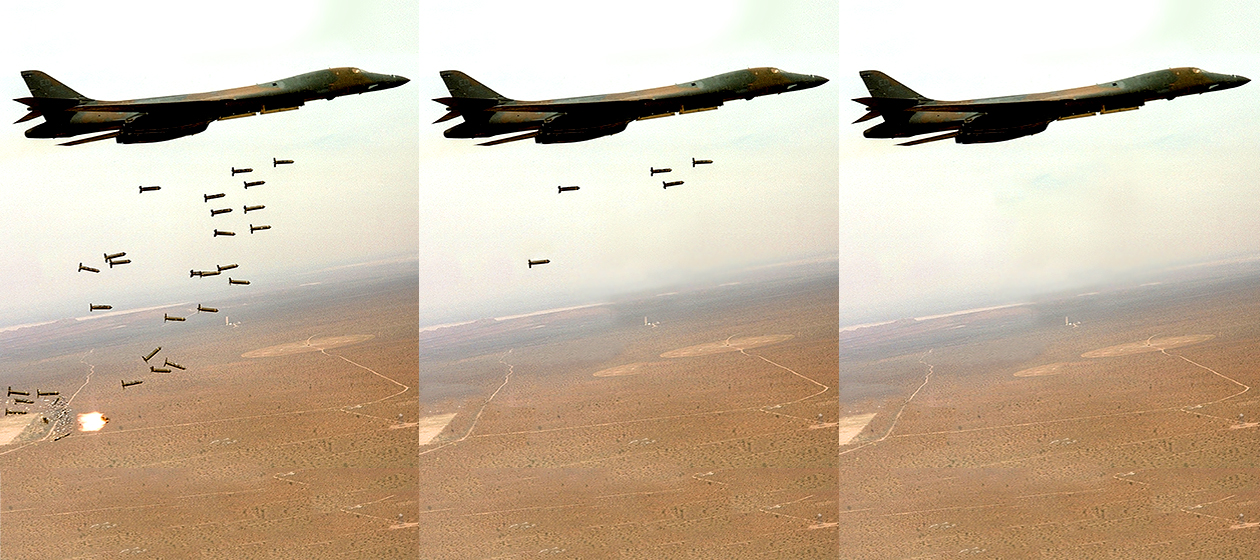Do nothing in Syria
Give inaction a chance


If you're looking for evidence of the radicalism of the supposedly sensible, responsible center of foreign policy thinking inside the Washington beltway, consider the fact that of all the events of President Trump's rocky first year in office, the one for which he received the most fulsome praise from Republicans and Democrats alike was his decision to launch a barrage of Tomahawk missiles at Syria exactly one year ago this week.
The occasion of that attack was of course the apparent use of chemical weapons by Syrian dictator Bashar al-Assad in the country's bloody, interminable civil war. At the time, that civil war had been going on for six awful years. One year later, Assad has apparently used such nominally banned weapons again, and the result is exceedingly likely to be another barrage of missiles and more praise from Washington's Very Serious Thinkers, who will almost certainly limit their criticism of the military strike to saying it's too limited, too restrained, too little, and too late to make the difference America could have and should have made in the conflict years ago.
That's because even in this moment of maximal polarization and partisanship, there is one thing that unites just about everyone in and around the nation's capital: love of war.
The Week
Escape your echo chamber. Get the facts behind the news, plus analysis from multiple perspectives.

Sign up for The Week's Free Newsletters
From our morning news briefing to a weekly Good News Newsletter, get the best of The Week delivered directly to your inbox.
From our morning news briefing to a weekly Good News Newsletter, get the best of The Week delivered directly to your inbox.
From congressional and White House staffers to bureaucrats toiling away in the bowels of the Pentagon and in the myriad branches of the intelligence community to think tank fellows and employees working for defense contractors, the consensus is that when bad things happen across wide swaths of the globe, it is our duty as Americans to do something about it — which nearly always means blowing something to bits from a few hundred or few thousand miles away.
If Trump were wise (haha), he would resist the temptation to do anything to insert the U.S. more deeply into the morass of the Syrian civil war. Indeed, he would follow through on his statements from just a few days ago indicating that the American military would soon be pulling back from its role in the fighting. The Trump administration is a crashing disaster across multiple fronts, but if it managed to continue the process, begun (haltingly, inconsistently) under President Obama, of breaking our self-subversive habit of defining our national interest so broadly that everything bad that happens in the world looks like a problem we can and must solve militarily, then Trump would have managed to do at least a little bit of good.
But alas, it isn't going to happen — because The Blob (the term favored by Obama's foreign policy adviser Ben Rhodes for Washington's foreign policy establishment) defaults toward meddling militarily in the world's problems, in the misplaced hope that such interventions will allow us to control chaos and impose an order on the globe that will benefit the United States.
This is true from one end of The Blob to another. So the liberal internationalists who worked for Obama during his first term (Hillary Clinton, Susan Rice, Samantha Power) favored overthrowing the Libyan dictator Moammar Gadhafi to prevent him from committing war crimes against his own people, just as the idealistic neocons in the administration of George W. Bush (Paul Wolfowitz, Lewis "Scooter" Libby, Douglas Feith) thought overthrowing Saddam Hussein and installing a democracy in Iraq would lead to the spread of free governments throughout the region, just as the hard-nosed realists who worked for Bush (Dick Cheney, Donald Rumsfeld, and Condoleezza Rice) clamored to invade Iraq because in the wake of the 9/11 attacks the tyrant posed a threat too great to American safety and security.
A free daily email with the biggest news stories of the day – and the best features from TheWeek.com
The aims vary, but the means remain the same: launch missiles now, ask questions later — or never. That's certainly going to be the approach favored by Trump's new national security advisor John Bolton. At the level of analysis, Bolton is firmly in the realist camp, displaying little interest in such idealistic pursuits as spreading democracy. But he defines America's interests so broadly and so downplays the costs of war that he ends up being more hawkish than all but the most bellicose neocons.
It's been estimated that something on the order of 400,000 people have died in Syria's civil war. Now Assad has killed a few dozen more using a different kind of bomb and we will respond by killing a few more people in order to convey our disapproval to Assad's allies (Russia, Iran) and send a message to the rest of the world that chemical weapons are so morally beyond the pale that their use will prompt a punitive aerial assault by the United States. Meanwhile, our bombs and other military support will continue to enable Saudi Arabia to go right on killing people in Yemen, our own client in the region (Israel) will go right on killing Palestinians in the Gaza Strip, and we'll go right on killing others using good old-fashioned conventional munitions in the half-dozen or so endless, invisible wars we continue to wage across North Africa and South Asia.
That's the way it works in Washington, where doing something — even something dumb and deadly — is always preferable to doing nothing at all.
Damon Linker is a senior correspondent at TheWeek.com. He is also a former contributing editor at The New Republic and the author of The Theocons and The Religious Test.
-
 Film reviews: ‘The Testament of Ann Lee,’ ’28 Years Later: The Bone Temple,’ and ‘Young Mothers’
Film reviews: ‘The Testament of Ann Lee,’ ’28 Years Later: The Bone Temple,’ and ‘Young Mothers’Feature A full-immersion portrait of the Shakers’ founder, a zombie virus brings out the best and worst in the human survivors, and pregnancy tests the resolve of four Belgian teenagers
-
 Political cartoons for January 25
Political cartoons for January 25Cartoons Sunday's political cartoons include a hot economy, A.I. wisdom, and more
-
 Le Pen back in the dock: the trial that’s shaking France
Le Pen back in the dock: the trial that’s shaking FranceIn the Spotlight Appealing her four-year conviction for embezzlement, the Rassemblement National leader faces an uncertain political future, whatever the result
-
 Panama and Canada are negotiating over a crucial copper mine
Panama and Canada are negotiating over a crucial copper mineIn the Spotlight Panama is set to make a final decision on the mine this summer
-
 Why Greenland’s natural resources are nearly impossible to mine
Why Greenland’s natural resources are nearly impossible to mineThe Explainer The country’s natural landscape makes the task extremely difficult
-
 Iran cuts internet as protests escalate
Iran cuts internet as protests escalateSpeed Reada Government buildings across the country have been set on fire
-
 US nabs ‘shadow’ tanker claimed by Russia
US nabs ‘shadow’ tanker claimed by RussiaSpeed Read The ship was one of two vessels seized by the US military
-
 How Bulgaria’s government fell amid mass protests
How Bulgaria’s government fell amid mass protestsThe Explainer The country’s prime minister resigned as part of the fallout
-
 Femicide: Italy’s newest crime
Femicide: Italy’s newest crimeThe Explainer Landmark law to criminalise murder of a woman as an ‘act of hatred’ or ‘subjugation’ but critics say Italy is still deeply patriarchal
-
 Brazil’s Bolsonaro behind bars after appeals run out
Brazil’s Bolsonaro behind bars after appeals run outSpeed Read He will serve 27 years in prison
-
 Americans traveling abroad face renewed criticism in the Trump era
Americans traveling abroad face renewed criticism in the Trump eraThe Explainer Some of Trump’s behavior has Americans being questioned
